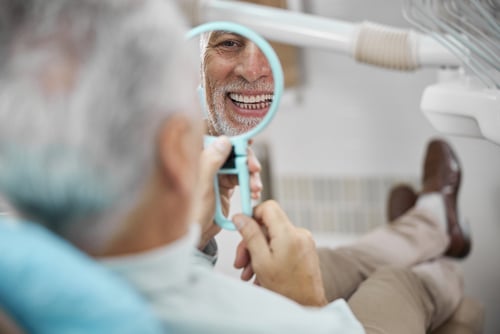General Anesthesia Dentistry in Union City, NJ
If you are worried about visiting the dentist or have put off necessary dental care due to anxiety, you’re not alone. In 2022, the National Institute of Dental and Craniofacial Research reported that 1 in 5 American adults experience moderate to high dental fear and anxiety. For these patients, general anesthesia dentistry provides a safe and effective way to manage distress and receive oral healthcare.
Because oral health and overall health are so closely intertwined, dental issues must be addressed efficiently. However, at Union City Mini Dental Implants, we recognize that visiting a dental office is very challenging for patients with dentophobia—an extreme fear of going to the dentist.
Whether you have a dental phobia or want to be put to sleep for other reasons, we offer expert general anesthesia dentistry to our valued patients in Union City, NJ.
What Is General Anesthesia Dentistry?
 Sedation dentistry encompasses various levels of sedation that can be used to treat diverse patient needs. From minor treatments to invasive surgeries, sedation options are available to keep you calm and comfortable during your procedure. Our office utilizes local anesthesia, sedation, and general anesthesia according to each patient’s unique needs.
Sedation dentistry encompasses various levels of sedation that can be used to treat diverse patient needs. From minor treatments to invasive surgeries, sedation options are available to keep you calm and comfortable during your procedure. Our office utilizes local anesthesia, sedation, and general anesthesia according to each patient’s unique needs.
Local anesthesia is used to numb the surgical area for minor treatments. In these cases, the patient is completely alert and awake during the procedure. Conscious sedation—achieved via nitrous oxide, known as “laughing gas,” or an oral sedative in pill form—is used to relax the patient, who remains awake during the surgery. For patients requiring more intervention than is achieved with conscious sedation, general anesthesia can be used.
General anesthesia, the strongest form of anesthesia, is a controlled loss of consciousness induced by medication. Administered through an intravenous (IV) line, general anesthesia elicits deep unconsciousness, meaning you will be completely asleep for the duration of the procedure. Because the medication stops the nerves from sending signals to the brain, you won’t feel any pain during the procedure or remember the surgery once you wake. This makes general anesthesia suitable for patients with dental phobia or those who cannot otherwise tolerate the procedure.
When Is General Anesthesia Used?
Not all dental offices provide general anesthesia as an option for sedation, but we know that certain conditions can prevent patients from seeking necessary dental care. At Union City Mini Dental Implants, we are equipped with the resources needed to provide general anesthesia, and we partner with a trained and experienced anesthesiologist to administer it.
We may recommend general anesthesia if it is safer and more comfortable for you to be asleep, like in the following situations:
- Patients with dental anxiety or dentophobia who would otherwise avoid needed oral healthcare
- Patients undergoing time-consuming or complex procedures like full mouth reconstruction
- Patients with certain medical conditions that are worsened by stress
- Patients who have a strong gag reflex
Risk Factors
While general anesthesia effectively minimizes distress and maximizes comfort during dental procedures, not every patient is a good candidate.
Factors that can increase the risk for complications include:
- Certain allergies
- Diabetes
- Heart, lung, or kidney disease
- High blood pressure
- Sleep apnea
- Epilepsy
- Obesity
- Stroke
- Lifestyle habits like smoking tobacco or drinking alcohol in excess
At your free consultation, we will discuss these risk factors to determine if general anesthesia is right for you.
General Anesthesia Dentistry: The Process
 During your complimentary consultation, we will conduct an oral exam to evaluate your oral health and determine your treatment needs. This initial consultation also includes a discussion of your dental goals and concerns. If you are interested in general anesthesia, we will determine if you are a strong candidate by discussing your full medical history, including any medical conditions you have, the medications and supplements you take, your health habits, and any previous experiences with anesthesia. If you are eligible for general anesthesia, we will review the risks and benefits and make sure you understand the necessary pre- and post-operative instructions.
During your complimentary consultation, we will conduct an oral exam to evaluate your oral health and determine your treatment needs. This initial consultation also includes a discussion of your dental goals and concerns. If you are interested in general anesthesia, we will determine if you are a strong candidate by discussing your full medical history, including any medical conditions you have, the medications and supplements you take, your health habits, and any previous experiences with anesthesia. If you are eligible for general anesthesia, we will review the risks and benefits and make sure you understand the necessary pre- and post-operative instructions.
Before your procedure, you must arrange for someone to drive you home since general anesthesia will affect your coordination, concentration, and reflexes. On the day of your surgery, the anesthesiologist will administer the general anesthesia through an IV in your hand or arm.
It generally takes only a couple of minutes for the anesthesia to take effect.
Throughout the procedure, we continually monitor you to ensure you are safe. We will closely monitor vital signs, including your breathing, temperature, heart rate, blood pressure, blood oxygen level, and fluid levels. The anesthesiologist will also adjust the medication as needed to keep you asleep for the duration of the procedure.
At the end of your procedure, you’ll wake up gradually, sporting a radiant new smile without any recollection of the dental work completed.
What to Expect After Your Procedure
You can expect to feel groggy for a few hours after your procedure. Because the drugs can stay in your system for up to 24 hours, having a trusted adult with you is best as the anesthesia wears off.
Within these 24 hours, be sure to prioritize rest and relaxation, stay home from work or school, refrain from driving, and avoid taking any medications not prescribed by your doctor. Following these guidelines will help you heal properly from your procedure.
For the first 24-48 hours following your procedure, you may experience changes to your memory, concentration, and reflexes. These and other common side effects, like drowsiness, may linger for a few days but diminish with time. Other possible side effects include nausea and vomiting, sore throat, confusion or disorientation, muscle aches, chills, shivering, itching, and dry mouth.
Additional aftercare instructions will depend on the dental work you receive, but we will make sure you clearly understand all aftercare details prior to your procedure.
General Anesthesia Dentistry: Get Dental Work While You Sleep
At Union City Mini Dental Implants, we understand that dental fear and other conditions can inhibit our patients from receiving their needed dental work. Partnering with an expert anesthesiologist, we can provide our valued patients with the option of general anesthesia dentistry. Whether you need full-mouth mini dental implants, Fix-on-Six® dental implants, or another complex treatment, we can complete your procedure while you sleep.
Contact us today to determine your eligibility for general anesthesia dentistry. Rest assured that your comfort and care are our priorities.
